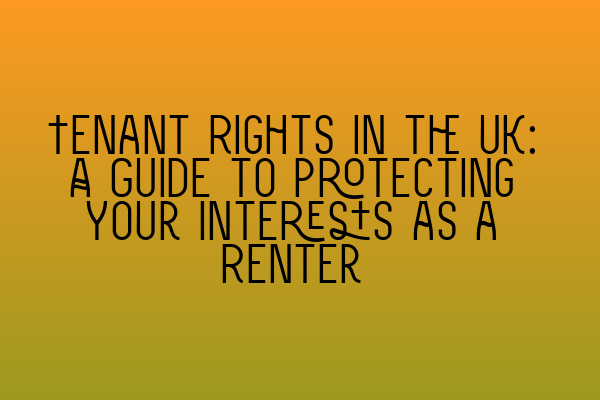Tenant Rights in the UK: A Guide to Protecting Your Interests as a Renter
Renting a property can be an exciting and convenient way to find a place to call home. However, it’s important to educate yourself about your rights as a tenant to ensure you are protected and treated fairly. In this article, we will explore the key tenant rights in the UK and provide you with valuable information to help you safeguard your interests.
Understanding Tenancy Agreements
One of the first things you should do when renting a property is to carefully review the tenancy agreement. This legal document outlines the terms and conditions of your tenancy, including rent amount, payment frequency, and the duration of the lease. It’s essential to understand the agreement fully before signing it to avoid any potential disputes or misunderstandings later on.
For an in-depth understanding of contract law, make sure to check out our related article on Ethics in Contract Law: Navigating the Moral and Legal Dimensions.
Deposit Protection
When you rent a property in the UK, your landlord is required to protect your deposit in a government-approved scheme. This safeguards your deposit against unfair deductions and ensures its safe return at the end of your tenancy. It’s crucial to check that your deposit is protected and to request the necessary information from your landlord or letting agent.
Rent Increases
While landlords have the right to increase rent, they must follow certain procedures and provide proper notice. In most cases, your rent can only be increased once a year, and the amount should be reasonable. If you believe your landlord has unfairly increased your rent or failed to follow the correct procedures, it’s advisable to seek legal advice to protect your rights as a tenant.
Maintenance and Repairs
Your landlord has a legal obligation to maintain the property and ensure that it is in a habitable condition. This includes repairing any structural issues, fixing heating or plumbing problems, and addressing other essential maintenance needs. If you encounter any repair issues, make sure to communicate them to your landlord in writing and keep a record of all correspondence.
For a deeper dive into the legal aspects of misrepresentation in contracts, take a look at our related article: Misrepresentation in Contracts: Unveiling Deceptive Practices.
Right to Privacy
As a tenant, you have the right to enjoy your home without unnecessary intrusion from your landlord or letting agent. They must give you reasonable notice before entering the property, except in cases of emergency. This ensures your privacy and allows you to feel secure in your rented accommodation.
Eviction Process
If your landlord wishes to evict you, they must follow the proper legal procedures. In most cases, they will need to serve you with a notice, such as a Section 21 notice for a no-fault eviction or a Section 8 notice for breaches of the tenancy agreement. It’s important to understand your rights in these situations and seek professional advice if needed.
Further Resources
For a comprehensive overview of contract law as part of the SQE syllabus, be sure to read our related article: A Closer Look at SQE Contract Law Syllabus.
If you’re interested in exploring SQE Contract Law further and examining landmark cases and influential judicial decisions, you’ll find our article on SQE Contract Law: Analyzing Landmark Cases and Influential Judicial Decisions particularly enlightening.
Lastly, if you’re considering entering into a contract for services, our article on Contract Law for Services: Key Considerations and Best Practices will offer you valuable insights and guidance.
Conclusion
Knowledge is power when it comes to protecting your rights as a tenant in the UK. By understanding your tenancy agreement, deposit protection, rent increases, maintenance and repairs, privacy rights, and the eviction process, you can ensure that your interests are safeguarded. If at any point you have concerns or encounter issues, seeking professional legal advice is always recommended.
At SQE Property Law & Land Law, we are here to assist you with any questions or concerns you may have regarding tenant rights or any other property law matters. Contact us today to schedule a consultation and let us help you protect your interests as a tenant.
